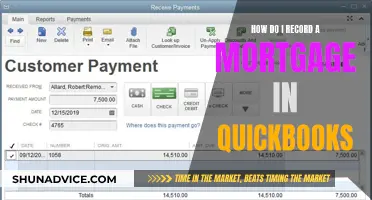
There are many ways for mortgage brokers to generate leads, from digital marketing and technology to attending industry events and networking. A well-designed, optimised website is key to attracting leads, as is creating quality content that establishes authority and trust. Social media is also an important tool, with platforms like LinkedIn, Facebook and Twitter offering opportunities to network and market to potential clients. Google Ads and local listings can also help generate leads, as can more traditional methods like direct mail and telemarketing.
| Characteristics | Values |
|---|---|
| Website | Build a well-designed, credible website with purposeful design and good content. |
| Google Ads | Run Google Ads campaigns for the keywords “mortgage” and your city or town. |
| Google My Business | Create a free Google My Business listing to claim local search results. |
| YouTube | Create a YouTube channel and upload helpful, interesting, and easy-to-share videos that answer people's questions about mortgages. |
| Social Media | Use LinkedIn, Facebook, Twitter, and Instagram to network with people in your area. |
| Online Advertising | Place ads on websites that people visit frequently. |
| Content Marketing | Create great content that demonstrates your expertise, thereby building authority and trust. |
| Networking | Network with real estate agents, builders, and financial advisors. |
| Referrals | Ask for recommendations from satisfied clients. |
| Direct Mail | Send direct mail to potential customers. |
| Telemarketing | Use telemarketing to pre-qualify potential customers before they speak to a lender. |
| Lead Lists | Buy lead lists from lead generation companies and make cold calls. |
What You'll Learn

Google Ads and SEO
Google Ads
Google Ads is an effective way for mortgage brokers to generate leads and increase their client base. While it has a reputation for being expensive, Google Ads can produce a better return on investment than other forms of advertising. It allows advertisers to specify a list of keywords that potential clients may search for, such as "mortgages for doctors" or "first-time buyer mortgages". By targeting specific niches within the mortgage industry, brokers can create more focused and lower-cost campaigns.
To optimise Google Ads campaigns, it is crucial to define the target audience and create separate landing pages for each mortgage type. These pages should be tailored to specific keywords, making the content relevant to the visitor's search. Lead capture forms are an essential component of effective landing pages, but it is important to keep the form fields concise and relevant to ensure a smooth user experience.
SEO
Search Engine Optimisation (SEO) is another essential strategy for mortgage brokers to improve their online visibility and generate high-quality, motivated leads. By investing in SEO, brokers can improve their website's ranking in search results, making their services more easily discoverable by potential clients. This is achieved through a variety of techniques, including optimising website speed, ensuring mobile-friendliness, and creating valuable, unique content.
SEO offers exponential growth, with improvements in ranking leading to more leads and referrals. It is a sustainable and adaptable strategy that complies with privacy laws and protects client privacy by eliminating the need for third-party lead aggregators. By attracting borrowers actively searching for mortgage products, SEO generates leads that are more likely to convert.
In conclusion, both Google Ads and SEO are powerful tools for mortgage brokers to enhance their online presence and generate high-quality leads. While Google Ads can provide quick results with targeted campaigns, SEO offers long-term growth and improved credibility, creating a positive feedback loop that continually generates leads.
Zero-Down Mortgages: How to Sign Up and Get Started
You may want to see also

Social media marketing
Social media has become an indispensable tool for businesses to connect with potential customers and generate leads. Mortgage brokers can leverage its power to expand their reach, build brand awareness, and attract new clients. Here are some strategies for mortgage brokers to effectively use social media for lead generation:
Identify the Right Platforms and Understand Your Target Audience:
Determine which social media platforms your target audience uses the most. Popular platforms like Facebook, Instagram, LinkedIn, and Twitter offer vast audiences and unique features. Create profiles on relevant platforms, optimizing your presence with professional visuals, informative descriptions, and relevant keywords.
Create Engaging and Informative Content:
Content is key to social media success. Create valuable, engaging content that resonates with your audience. Share insights, tips, and advice related to mortgages, homebuying, and real estate. Use a mix of formats, including blog posts, videos, infographics, and interactive polls. Visual content, such as high-quality images and graphics, can effectively capture attention and convey your message.
Establish a Consistent Posting Schedule:
Consistency is vital in social media marketing. Maintain a regular posting schedule to keep your audience engaged. Share informative articles, tips for homebuyers, updates on interest rates, and success stories. Plan your content calendar in advance, ensuring a mix of promotional and informative content.
Leverage Paid Advertising:
Consider investing in paid advertising on social media platforms. Facebook, LinkedIn, and other platforms offer targeted options to reach specific demographics and interests. Create compelling ad campaigns that highlight your mortgage services and direct potential clients to your website or landing pages.
Collaborate and Network:
Social media provides networking opportunities with industry professionals, such as real estate agents, home builders, and financial planners. Connect and collaborate with complementary businesses for cross-promotion, guest blogging, and co-hosting webinars or events. Building relationships with industry partners can expand your reach and generate valuable referrals.
Engage and Build Trust:
Social media is a two-way communication channel. Respond promptly and professionally to comments, messages, and inquiries. Encourage conversations, address concerns, and foster a sense of community. By actively engaging with your audience, you build trust and credibility, increasing the likelihood of converting leads into clients.
Removing Deceased Husband from Mortgage: Legal and Financial Steps
You may want to see also

Networking and referrals
Building Industry Connections:
- Forming Strategic Partnerships: Real estate agents, brokers, and other trusted partners are crucial sources of referrals. Nurture relationships with these professionals by offering exclusive benefits, competitive rates, and superior customer service. Attend industry events, seminars, and conferences to connect and showcase your expertise.
- Collaborative Marketing: Collaborate with real estate agents and local businesses on joint marketing campaigns. This cross-promotion can extend your reach and generate mutual referrals.
- Educational Events: Host workshops, webinars, or seminars to demonstrate your expertise and provide valuable insights to potential clients and industry partners. This establishes you as a knowledgeable and trustworthy broker.
- Leveraging Digital Platforms: Utilize LinkedIn, Facebook, and other social media platforms to connect with industry professionals and showcase your knowledge. Create informative content, such as blog posts, videos, or podcasts, to establish yourself as a thought leader and provide value to your network.
Community Engagement:
- Local Events: Participate in community events such as charity runs, fairs, and business expos. Set up informational booths, distribute marketing materials, and engage with community members to raise awareness about your services.
- Support Local Causes: Show your commitment to the community by sponsoring local initiatives or charities. This helps build your local reputation and fosters goodwill, leading to potential word-of-mouth referrals.
Client Experience and Referrals:
- Streamline the Process: Focus on making the home loan process easier and more streamlined for your clients. Happy customers are more likely to recommend your services to others.
- Ask for Referrals: Don't be afraid to ask satisfied clients for referrals. Maintain consistent and clear communication with your clients, so they know what to expect and feel confident referring you to their network.
- Show Gratitude: Express your appreciation for referrals, whether through handwritten thank-you notes, promotional merchandise, or small gifts.
By implementing these networking and referral strategies, mortgage brokers can effectively generate leads and grow their business.
Requesting a Payoff Statement: United Wholesale Mortgage Guide
You may want to see also

Website optimisation
Search Engine Optimisation (SEO)
SEO is the process of optimising your website to rank higher in organic search results. By utilising relevant keywords and phrases, you can improve your website's visibility when potential clients search for terms related to mortgage services. Focus on long-tail keywords with high intent, such as "first-time home buyer guide" or "refinancing options". Additionally, ensure your website has high-quality, unique content that provides value to users. This can include in-depth articles, blog posts, or tutorials that establish your expertise and build trust with potential leads.
Pay-Per-Click (PPC) Advertising
PPC advertising allows you to place ads at the top of search engine results or on social media platforms, targeting potential clients actively searching for mortgage-related information. Google Ads is the most popular platform for this, allowing you to target specific keywords and markets. While PPC can be expensive, it provides immediate visibility and can drive highly qualified leads. Create compelling ad copy with a strong call to action, and ensure your landing pages are optimised for conversions.
Website Forms and Lead Magnets
Implement multi-step forms on your website that educate potential leads on the mortgage application process, and then capture their contact information, such as an email address, to provide an automated quote. This approach respects the user's journey and can boost conversion rates. Additionally, offer lead magnets—free resources such as e-books or guides—in exchange for personal information. This tactic can be highly effective, as buyers tend to consume a lot of content before making mortgage-related decisions.
Social Media Presence
Establish a strong social media presence on platforms such as Facebook, LinkedIn, and Twitter. These platforms can be utilised to publish short educational videos, offer advice in groups, and promote your content. Social media provides an opportunity to showcase your expertise and build relationships with potential leads.
Reviews and Testimonials
Strengthen your website and online presence by requesting reviews from past clients. Encourage clients to leave feedback on your Google My Business page, as this can improve your search engine rankings and social proof. Positive reviews will make your business more appealing to potential leads, increasing the likelihood of conversion.
By implementing these website optimisation strategies, mortgage brokers can effectively generate high-quality leads and convert them into customers.
Taking Out a Second Mortgage: Is It Worth It?
You may want to see also

Online content creation
To begin with, it is important to establish an online presence with a website. This involves choosing a domain name, designing the website, and creating content. The website should be easy to navigate, with a clear value proposition, and include contact information and call-to-action buttons. It should also be optimised for search engines, using relevant keywords and backlinks, to improve local SEO rank and appear in the top results on search engine results pages (SERPs).
Once the website is set up, creating valuable content that educates potential customers about the mortgage process is key. This can be in the form of blog posts, articles, infographics, or videos, and it should be published regularly to keep the website looking alive and up-to-date. This content can also be shared on social media platforms such as Facebook, LinkedIn, and Twitter, to reach a wider audience and drive traffic back to the website.
Another way to create content is through guest podcasting and guest blogging on other people's websites. This allows mortgage brokers to showcase their expertise and reach a new audience. It is also important to use social media to connect with potential clients, share industry knowledge, and build brand awareness. Social media platforms can also be used to collect reviews and recommendations from past clients, which can help to build trust with potential customers.
Finally, it is important to analyse the effectiveness of online content creation through tools such as Google Analytics. This can help mortgage brokers understand their audience's demographics, click-through rate, and time spent with the content, allowing them to adjust their strategy accordingly.
Beginning Your Mortgage Journey: Where to Start
You may want to see also







